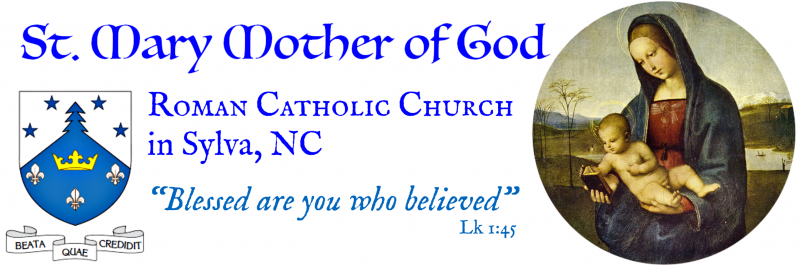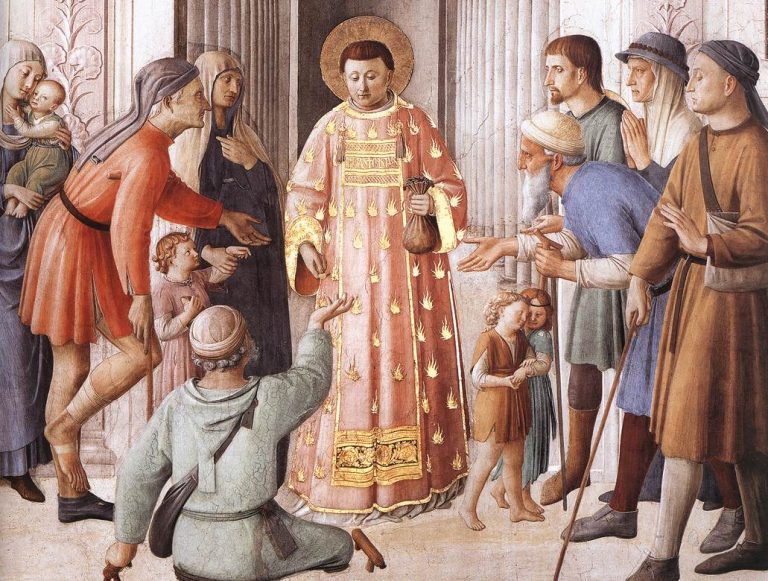From the Pastor…
On April 14, at St. Mark’s Catholic Church in Huntersville, 15 men will be ordained deacons for the Diocese of Charlotte. Among them will be two men from St. Mary’s: David Ramsey and Matthew Newsome. To the best of my knowledge, they will be the first men from our parish ordained to the diaconate, so I wanted to take the opportunity to share a bit about what the diaconate is and what our two new deacons may be doing for the Church.
WHAT IS THE DIACONATE?
Deacons are clerics, ordained by the bishop through the sacrament of Holy Orders, which the Catechism calls “the sacrament of apostolic ministry” (CCC 1536). There are three degrees of Holy Orders: episcopate (bishops), presbyterate (priests), and diaconate (deacons). Deacons are the lowest order in the hierarchy. In the words of the Second Vatican Council, deacons are ordained “not unto the priesthood, but unto the ministry” (Lumen Gentium 29). So even though they are not priests, deacons are ordained Catholic ministers. When one receives a higher degree of holy orders, one does not leave the lower degree behind. Thus every priest is a deacon, and every bishop is a priest and a deacon. One sometimes hears deacons referred to as permanent or transitional. Transitional deacons anticipate receiving further ordination to the priesthood, while permanent deacons do not. There is no substantial difference between them — there is only one order of deacon.
The Greek word diakonia means “servant” or “minister.” Diaconal ordination configures the deacon to Christ, who became servant of all (Mk 10:45). The particular ministry of the deacon is described by the Second Vatican Council as “the service (diakonia) of the liturgy, of the Gospel, and of works of charity” (Lumen Gentium 29). While deacons cannot celebrate the Eucharist, administer Confirmation, anoint the sick, or hear confessions, they can preside at baptisms, weddings and funerals. They can offer Benediction during Adoration. And they can confer blessings on people and objects (except for those specifically reserved to priests or bishops).
Like any minister of the Catholic Church, a deacon has the authority to instruct and guide the faithful through his teaching and preaching of the gospel.
WHO CAN BE A DEACON?
According to the Code of Canon Law, “only a baptized man validly receives sacred ordination” (can. 1024). And according to the Catechism of the Catholic Church, “No one has a right to receive the sacrament of Holy Orders. Indeed no one claims this office for himself; he is called to it by God” (CCC 1578). Men discerning a call to the diaconate must be accepted by the bishop, with the recommendation of their pastor, and (in the case of married men) the permission of their wives.
In the Latin (Western) Church, while priests and bishops are required to be celibate, married men may be ordained to the diaconate. In the Eastern Churches married men may be ordained deacons and priests, but only celibate men as bishops. However, no one may marry after they are
ordained. If a married deacon’s wife predeceases him, he may not remarry. In the Diocese of Charlotte, the applicant for diaconal formation must be at least 33 years of age at the start of formation, no older than 69 at the time of ordination, have been a Catholic in good standing for at least five years, and, if married, have been in a stable marriage for at least three years. Permanent deacons in the Roman Catholic Church do not ordinarily receive financial remuneration (unless they are otherwise employed by the Church), and so are expected to be financially stable.
WHAT IS DIACONAL FORMATION LIKE?
Before being accepted into formation, aspirants to the diaconate must have completed the twoyear lay ministry formation program offered by the diocese. Then they enter into a discernment year, called Aspirancy. That is followed by a four-year formation program, involving both in person and on-line classes covering many of the same topics as seminary formation. They receive spiritual direction and formation throughout the process. This means that Matt and David are nearing the end of a seven-year journey – in actuality longer, as both men began discerning the call to the diaconate many years before entering the formation program. The end of this journey is only the beginning of something much greater for both of them. Like most men called to the diaconate, David and Matt have been serving the Church in many different ways over the years. They will continue to do so now with the added grace of sacramental ordination – a grace given not for their own benefit, but for the good of those whom they serve (CCC 1534).
WHAT DO DEACONS DO?
Deacons minister in a variety of ways according to the needs of the local church. They take Communion to the sick and home bound. They teach faith formation and RCIA classes. They serve in prison or hospital ministry. In our case, Matt will continue in his job as campus minister at WCU.
Deacons also have a very important liturgical role, proclaiming the gospel at Mass and assisting the priest in celebrating and distributing the Eucharist, especially with the chalice. During Mass, the deacon wears a special vestment called a dalmatic, similar to a priest’s chasuble except that it has sleeves. Under this a deacon wears an alb and stole, just like a priest, with one important difference. Whereas a priest wears his stole over both shoulders, a deacon wears his stole over one shoulder only. The stole signifies ecclesial authority, and this different manner of wearing the stole indicates the lower degree of authority possessed by the deacon.
In addition to proclaiming the gospel, the deacon also leads the Universal Prayer (the prayers of the faithful), and dismisses the people at the end of Mass. The deacon may also preach the homily, with the permission of the priest celebrant. One important note: as an ordained minister of the Church, the deacon is an ordinary minister of Holy Communion. This means it is his proper role to assist the priest (who is the minister of the Eucharist) in distributing Communion.
CLERICAL CLOTHING
While Canon Law stipulates that clerics wear ecclesial dress (can. 284), permanent deacons are not bound by this (can. 288). Diocesan bishops have established a variety of policies in this area. Some have chosen to forbid deacons from wearing clerical clothing. Others have mandated deacons wear a clerical collar when serving in certain situations (such as in hospitals or prisons). In the Diocese of Charlotte, Bishop Jugis encourages deacons to wear clerical dress any time they feel it will benefit their ministry. Dressing the part not only helps identify the deacon to others as a Catholic minister, it also serves as a reminder to him of his sacred calling.
WHAT ARE DEACONS CALLED?
Formally, deacons are addressed as “Reverend Mister” (Rev. Mr.) — or in David’s case, “Reverend Doctor” (Rev. Dr.). Informally, a deacon would be addressed simply as “Deacon” (Dcn.) The norm in the Latin Church is to address ministers by their title and last name, though some choose to be called by their first name (which is the norm in religious orders, as well as in the Eastern Churches).
Matt says: “Everyone in the parish, including my students on campus, have always just called me Matt. I’m not suddenly going to start demanding last-name formality. I’m very happy to be called Deacon Matt, Deacon Matthew, or just plain Deacon.”
David says: “As a physician, patients, friends, and colleagues have addressed me in all kinds of ways such as Dr. Ramsey, Dr. David, or informally as simply David. It is not important to me. As a deacon I assume it would be similar; Deacon David or Deacon in respect for the Church, or in informal situations as simply David.”
ONE FINAL CONSIDERATION
Deacons are ordained to serve the diocese, not just the parish. Just like priests, they serve at the bishop’s pleasure and are under his authority. The bishop can assign a deacon to any parish in the diocese, or even to an extra-parish ministry. Unlike priests, married deacons have families and outside jobs to consider. This means that their parish assignment will ordinarily be within a reasonable drive from their home. The assignments for the newly ordained deacons will be announced on the day of their ordination — and no, the candidates themselves don’t know, so don’t ask them! Whether they are assigned to St. Mary’s or to one of our neighboring parishes, they will need our prayers and support in their ministry.
CELEBRATE WITH US!
The ordination Mass will begin at 10:00am on Saturday, April 14, at St. Mark’s in Huntersville. It is open to the public. So all are invited and we hope many from the parish will be able to participate in this joyous occasion. We are told it will also be live-streamed online through the Catholic News Herald Website at www.catholicnewsherald.com and/or the Catholic News Herald Facebook page livestream link.
Come celebrate with us at the Sunday Masses April 15th as David and Matt serve their first Masses respectively as Deacon’s and offer their first Homilies. David will be serving as Deacon of the Mass at 9:00am and Matt will be serving as Deacon of the Mass at the 11:00am Mass.
We also plan on celebrating as a parish with a Pig Pick’n and Potluck Reception after the 11:00am Mass Sunday, April 15, here at St. Mary’s. All are invited and please bring a favorite side dish or dessert to share.
Please keep David and Matt and their classmates along with all of their families in your prayers in a special way this week as they await this momentous and joyful occasion for our Parish of St. Mary’s and the Church of Charlotte.
In the Love of Christ Jesus through Mary,
Fr. Coleman

